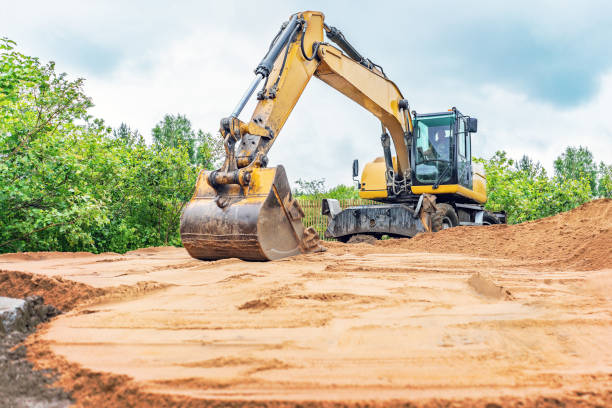The Art of Site Grading: Shaping the Ground for Success
Introduction
When it comes to construction and landscaping projects, the groundwork plays a pivotal role in ensuring success. One fundamental aspect of this groundwork is site grading – a process that involves shaping the land to achieve desired slopes and elevations. In this blog post, we’ll delve into what site grading is, why it’s crucial, and how this transformative process is expertly executed.
Understanding Site Grading
What is Site Grading? Site grading is the process of modifying the topography of a piece of land to achieve specific slopes and elevations. This technique is employed for various purposes, including creating a level surface for construction, improving drainage, preventing erosion, and enhancing the overall aesthetics of the site. If you are in need of site grading services in Knoxville TN call us today for a free quote!

The Importance of Site Grading: Effective site grading is critical for several reasons:
Foundation Stability: Proper site grading ensures a level and stable foundation for buildings and structures. This is essential for the structural integrity of the construction and prevents uneven settling.
Drainage Management: Site grading is instrumental in controlling water drainage. It helps direct water away from structures, preventing issues such as flooding, soil erosion, and water damage.
Landscaping and Aesthetics: Site grading plays a key role in creating visually appealing landscapes. It allows for the creation of terraces, slopes, and other features that enhance the overall aesthetics of the site.
Accessibility: Grading ensures that a site is accessible and meets the necessary safety standards. It involves creating gentle slopes and ramps for ease of movement, particularly in areas where accessibility is crucial.
The Site Grading Process Unveiled
1. Site Assessment: Before embarking on the grading process, a thorough site assessment is conducted. This involves analyzing the existing topography, soil composition, and drainage patterns. The information gathered during this phase informs the grading plan.
2. Grading Plan Development: Based on the site assessment, engineers and designers develop a grading plan that outlines the desired changes to the topography. This plan considers factors such as slopes, elevations, and drainage patterns.
3. Clearing and Preparation: The site is cleared of any vegetation, debris, or obstacles that might impede the grading process. This step ensures a clean slate for the subsequent grading activities.
4. Rough Grading: The initial phase of grading involves moving large amounts of soil to establish the general shape of the land according to the grading plan. Heavy equipment, such as bulldozers and graders, is used to reshape the terrain.
5. Fine Grading: Fine grading focuses on refining the contours of the land to meet the precise specifications outlined in the grading plan. This phase demands a higher level of precision and may involve smaller equipment, such as skid-steer loaders.
6. Compaction: Once the desired slopes and elevations are achieved, the graded area undergoes compaction. This process involves using heavy machinery to compress the soil, increasing its density and stability.
7. Drainage Installation: To address water management, drainage systems are often installed during the grading process. This may include features like swales, culverts, or retention ponds, depending on the site’s specific needs.
8. Inspection and Adjustment: Throughout the grading process, inspections are conducted to ensure that the work aligns with the grading plan. Adjustments are made as needed to achieve the desired outcome.
Choosing the Right Professionals for Site Grading
The success of any site grading project hinges on the expertise of the professionals involved. It requires a delicate balance between engineering know-how, practical experience, and a keen understanding of the site’s unique characteristics.
Why Choose Experts in Site Grading:
Technical Proficiency: Experienced grading professionals possess the technical skills to accurately assess the site, develop precise grading plans, and execute the grading process with precision.
Equipment and Resources: Established grading contractors have access to a diverse range of state-of-the-art equipment, ensuring that the grading process is efficient and meets industry standards.
Regulatory Compliance: Professionals are well-versed in local regulations and environmental considerations. They ensure that the grading work complies with all relevant codes and permits.
Risk Mitigation: Site grading involves inherent risks, including soil erosion and compaction issues. Skilled professionals employ risk mitigation strategies to address these challenges effectively.
Conclusion
In the grand scheme of construction and landscaping, site grading stands as a foundational process that shapes the very ground upon which projects are built. From ensuring stable foundations to managing water drainage and enhancing aesthetics, the importance of site grading cannot be overstated.
As you embark on your next construction or landscaping endeavor, consider the transformative power of site grading. Enlisting the expertise of seasoned professionals guarantees that the land beneath your project is not just a surface but a carefully sculpted canvas, ready to support and enhance your vision.